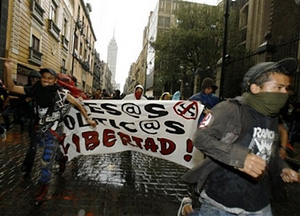 |
 |
 |
 News Around the Republic of Mexico | October 2006 News Around the Republic of Mexico | October 2006  
Mexico Marks Anniversary of Massacre
 Lisa J. Adams - Associated Press Lisa J. Adams - Associated Press


| | Mexican students protest in Mexico City, Monday Oct. 2, 2006. Hundreds of students were killed, on October 2, 1968 during a demonstration in Tlatelolco, Mexico. (AP/Claudio Cruz) |
A 1968 massacre of students in Mexico City remains a "wound in the national conscience," a presidential spokesman said Monday on the 38th anniversary of the killings.

Ruben Aguilar also said that a final report from a special prosecutor's office investigating the massacre in which at least 25 people were killed and other events in the nation's so-called "dirty war" should be released "in the next several days."

More than 5,000 demonstrators marched through the center of Mexico City on Monday commemorating the 1968 massacre. There were no immediate reports of arrests or injuries. Capital officials also held a special ceremony in memory of those killed in the crackdown.

Hundreds of people are believed to have been killed, jailed or disappeared in the 1960s and '70s during the dirty war, officials and human rights groups say.

Outrage about the 1968 massacre was "the beginning of the end of the authoritarian regime," Aguilar said, referring to the 71 years of uninterrupted rule by the Institutional Revolutionary Party, or PRI, which ended with President Vicente Fox's victory in 2000.

Government forces opened fire on a student protest in the capital's Tlatelolco Square on Oct. 2, 1968, just before Mexico hosted the Olympics. Officially, 25 people were killed, though human rights activists say as many as 350 may have died.

Special prosecutors say they have reviewed military documents indicating 360 sharpshooters fired from buildings surrounding the protest. The attack is considered one of the darkest moments of PRI rule. Another was the killing of a dozen students by government operatives during a peaceful anti-government march in 1971.

Fox appointed special prosecutor Ignacio Carrillo in 2002 to investigate these and other incidents of the "dirty war," a violent crackdown on leftist dissidents, often in response to kidnappings and other guerrilla acts.

Carrillo's investigations led to the arrest of several former officials from the federal government as well as the Pacific coast state of Guerrero.

But most of his tenure has been characterized by unsuccessful efforts to seek arrest warrants on genocide charges for former President Luis Echeverria, whom he accused of masterminding the 1968 massacre as Mexico's interior secretary.

According to a leaked draft of Carrillo's report, the most brutal human rights violations allegedly occurred during Echeverria's 1970-1976 administration.

Carrillo first sought Echeverria's arrest in July 2004 in connection with the 1971 student massacre and for the disappearance of leftist activists during his term. All of the charges have been thrown out or blocked by courts.

On Friday, a federal judge also threw out genocide charges against a former top domestic security chief, Miguel Nazar Haro, who had been accused of a direct role in the disappearance of six members of Brigada Lacandona, a 1970s guerrilla faction. The judge found there was not enough evidence to show he was involved.

The telephone at Carrillo's office repeatedly rang busy on Monday afternoon.

Mexican officials have said that Carrillo's investigative office would be permanently closed after his final report on abuses during the dirty war is released in the coming days.

Human Rights Watch recommended earlier this year that instead of closing the office, the government should appoint a "truth commission" to work with it in a continuing investigation.

The 38 years that have passed since the 1968 massacre have been marked by "the fight of many Mexicans to have a country where liberties are fully respected," Aguilar told reporters during his daily morning news conference at the presidential residence.

"Today we are closer to the Mexico that we all desire — a Mexico that guarantees for all the men and women of this country democracy, social justice and legal rights," he said.

Asked if the Mexican government considers the 1968 massacre a closed matter, Aguilar replied, "No, the acts of '68 are not closed. It is a wound in the country's history, a wound in the national conscience. It is an act that should never be repeated in a democratic society." | 
 | |
 |



